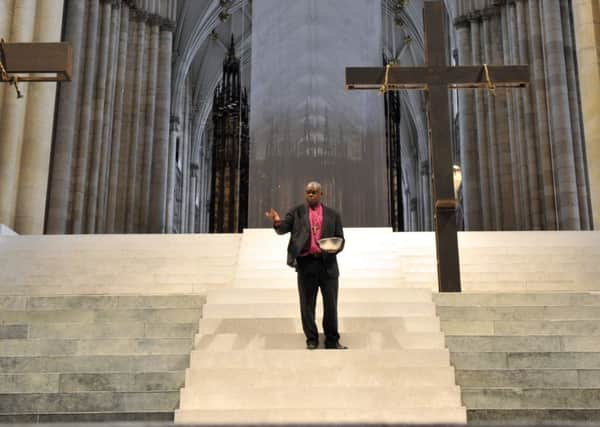John Sentamu: When it comes to Europe, I suggest to you that 'united we stand'


For me, it’s a matter of principle, based on commitment, consistency and conviction.
Back in 1975 I voted Yes to join the European Economic Community. In 2008, in the House of Lords, I spoke robustly in support of the Lisbon Treaty, which currently forms the constitution of the European Union. It was then my view that a referendum was unnecessary, because it was a matter for the Houses of Parliament to deal with.
Advertisement
Hide AdAdvertisement
Hide AdHowever, now that we have a referendum, I urge everyone to use their vote.
As a country, we made a commitment in 1975. It was a principled commitment, to work with our European neighbours for the common good.
That was pretty remarkable, when you consider that we had been at war with most of them at some time in the past.
Perhaps we were unconsciously heeding the English philosopher John Locke, who had written in the 17th century: “The only way by which any one divests himself of his natural liberty and puts on the bonds of civil society is by agreeing with other men to join and unite into a community.”
Advertisement
Hide AdAdvertisement
Hide AdYou may be more familiar with the “no man is an island” quotation from John Donne Dean of St Paul’s, also in the 17th century. The context, less well known, is particularly pertinent: “No man is an island, entire of itself; every man is a piece of the continent, a part of the main; if a clod be washed away by the sea, Europe is the less, as well as if a promontory were, as well as if a manor of thy friend’s or of thine own were; any man’s death diminishes me, because I am involved in mankind, and therefore never send to know for whom the bell tolls; it tolls for thee.”
We may live on an island, but no one is an island. We are inter-dependent, needing one another and especially our European neighbours.
Initially we were reluctant to join with them in the common enterprise; subsequently when we changed our minds, our application was rejected, but that was in the past. The United Kingdom is now an important and influential member.
To pull out now would look to all the world as if we were a capricious people, unreliable, not to be trusted, liable at any time to back-track on our commitments.
Advertisement
Hide AdAdvertisement
Hide AdOur capacity to work for peace and stability beyond our shores would be tragically diminished if we were to exclude ourselves such a vital co-operative venture.
Some European bureaucracy irritates me. There’s plenty of scope for change, but to abandon our principles on the pretext of short-term pragmatism would be morally wrong.
A couple of years ago, I published a series of essays with the title On Rock or Sand? Firm Foundations for Britain’s Future, in which I wrote: “As citizens of the Kingdom of God we live a common life together, reciprocating one another’s contributions and being dependent on one another in our reception of the good gifts of God.
“But since living together is not a state but an activity, this mutuality and sharing takes form in what we undertake to do – our co-operation.
Advertisement
Hide AdAdvertisement
Hide Ad“The fruit of our shared life is the human flourishing, the state of well-being, which God has promised us – life in all its fullness.”
This Well-being State – justified by our recognition of one another’s common humanity, expressed in neighbourly love and guided by the principles of freedom, fellowship, service, and the rule of law – are the firm foundation, the rock, we need for Britain’s future.
Only when we help one another perceive and imagine this vision together will we be like the wise builder of Jesus’s parable (Matthew, Chapter 7, verses 24-27; Luke 6, 46-49).
Need I remind you that the same parable offers an alternative, which is to build one’s house on sand?
All is well until storms and floods find out the weak foundations and the house falls.
When it comes to Europe, I suggest to you that “united we stand”.
Dr John Sentamu is the Archbishop of York.